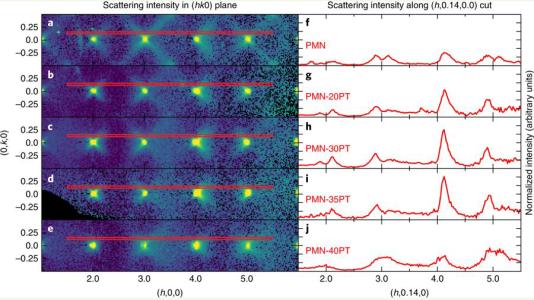
Scientific Achievement
Neutron and synchrotron x-ray scattering measurements reveal the relationship of various local order motifs to the underlying material properties in relaxor ferroelectrics.
Significance and Impact
Understanding the nature of local disorder and how it affects electromechanical, dielectric, and ferroelectric properties is key for designing more efficient materials.
Research Details
- Scattering measurements were performed on single crystals of PbMg1/3Nb2/3O3-xPbTiO3 (PMN-xPT), a canonical relaxor ferroelectric and piezoelectric system.
- Corelli, a novel neutron scattering instrument at the SNS that we designed, enabled measurements of the diffuse scattering with energy discrimination over the entire phase diagram.
- ”Butterfly” diffuse scattering is found to relate to piezoelectric properties, but surprisingly not to the relaxor behavior.
- Complementary neutron and x-ray data revealed that relaxor behavior results from the presence of competing local antiferroelectric and ferroelectric order.
- Our results provide guidelines for developing microscopic models.
Argonne National Laboratory seeks solutions to pressing national problems in science and technology. The nation’s first national laboratory, Argonne conducts leading-edge basic and applied scientific research in virtually every scientific discipline. Argonne researchers work closely with researchers from hundreds of companies, universities, and federal, state and municipal agencies to help them solve their specific problems, advance America’s scientific leadership and prepare the nation for a better future. With employees from more than 60 nations, Argonne is managed by UChicago Argonne, LLC for the U.S. Department of Energy’s Office of Science.
The U.S. Department of Energy’s Office of Science is the single largest supporter of basic research in the physical sciences in the United States and is working to address some of the most pressing challenges of our time. For more information, visit https://energy.gov/science.